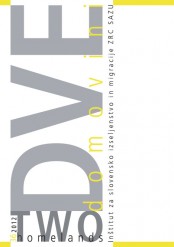Teachers from Slovenia and Sweden on Teaching (Newly) Immigrated Students
Keywords:
(newly) immigrated students, mother tongue, teaching adaptation, cultural heterogeneity vs. homogeneityAbstract
Integrating immigrant children in elementary schools is a problem for many school systems. A number of international studies show that in most countries students with immigrant backgrounds do not achieve comparable school outcomes. Some countries – such as Sweden in our case – have developed a range of support mechanisms. We found that Slovenia, in comparison to Sweden, does not provide the conditions to make it easier for immigrant students to learn Slovene and develop their own cultural identity.
Downloads
References
Bernstein, Basil (1996). Pedagogy, Symbolic Control and Identity: Theory, Research, Critique. London, Bristol: Taylor & Francis.
Bešter, Romana (2006). Integracijska politika – politika integracije migrantov: Teoretični primer in študija primera Republike Slovenije. Doktorska disertacija. Ljubljana: Univerza v Ljubljani, Fakulteta za družbene vede.
Save the children (2001). Denied a future? Summary. London: Save the children.
Dyson, Alan, Howes, Andy, Roberts, Barbara (2004). What do we really know about inclusive schools? A systematic review of the research evidence. Special educational needs and Inclusive education: Major themes in education (ur. David Mitchell). London, New York: Routledge Falmer, Taylor & Francis Group, 280–294.
Integrating immigrant children into schools in Europe – Sweden (2003/04). Brussels: Eurydice, http://eacea. ec.europa.eu/education/eurydice/documents/thematic_reports/101EN.pdf (15. 4. 2011).
Integrating immigrant children into schools in Europe (2009). Brussels: Eurydice.
Lesar, Irena (2005). The response of Slovenian teachers to the migrant children from former Yugoslavia. Dve domovini/Two Homelands 22: 49–58.
Lesar, Irena (2009). Šola za vse? Ideja inkluzije v šolskih sistemih. Ljubljana: Pedagoška fakulteta.
Lukšič Hacin, Marina (1999). Multikulturalizem in migracije. Ljubljana: ZRC.
Novak, Marta, Deutsch, Tomi, Cankar, Franc, Dečman Dobrnjič, Olga (2009). Adaptation of schools to migration circumstances. The 2009 Asian-Pacifi c forum on sociology of education: Social change and educational reform: Conference proceedings (English panels). Tainan: National University of Tainan, Taiwan, E-1-3-1-E-1-3-7.
OECD (2010). PISA 2009 Results: Overcoming Social Background: Equity in Learning Opportunities and Outcomes–volume II, http://www.oecd.org/document/61/0,3343,en_2649_35845621_ 46567613_1_1_1_1,00.html (15. 4. 2011).
Peček, Mojca (2005). Is primary school in Slovenia just and fair: The case of migrant children from former Yugoslavia. Dve domovini/Two Homelands 22: 29–48.
Pravilnik o preverjanju in ocenjevanju znanja ter napredovanju učencev v osnovni šoli (2008). Ljubljana: Ministrstvo za šolstvo in šport.
Resolucija o migracijski politiki Republike Slovenije. Uradni list RS, št. 40/99, http://www.uradni-list.si/1/ objava.jsp?urlid=2002106&stevilka=5265 (14. 4. 2011).
Sagadin, Janez (1991). Razprave iz pedagoške metodologije. Ljubljana: Znanstveni inštitut Filozofske fakultete.
Skubic Ermenc, Klara (2003). Enakost izobraževalnih možnosti v slovenski osnovni šoli s perspektive interkulturnosti. Doktorska disertacija. Ljubljana: Oddelek za pedagogiko in andragogiko Filozofske fakultete Univerze v Ljubljani.
Smernice za vključevanje otrok priseljencev v vrtce in šole (2010), http://www.zrss.si/pdf/250811092039_ smernice_-dopolnitev.pdf (10. 6. 2011).
Statistični urad Republike Slovenije, http://www.stat.si/ (27. 4. 2011).
Strategija vključevanja otrok, učencev in dijakov migrantov v sistem vzgoje in izobraževanja v Republiki Sloveniji (2007). Ljubljana: Ministrstvo za šolstvo in šport Republike Slovenije.
Sweden's Statistic Centre, http://www.scb.se/default2154.aspx (10. 6. 2011).
Tema modersmål, http://modersmal.skolverket.se/engelska/index.php/mother-tongue-education (14. 4. 2011).
Vižintin, Marijanca Ajša (2009). Sodelovanje slovenskih osnovnih šol z učitelji maternih jezikov otrok priseljencev. Dve domovini/Two Homelands 30: 193–213.
Vižintin, Marijanca Ajša (2010). Medkulturno izobraževanje in medkulturna občutljivost. Dve domovini/ Two Homelands 32: 139–150.
Zakon o osnovni šoli (2006), http://www.uradni-list.si/1/objava.jsp?urlid=200681&stevilka=3535 (14. 4. 2011).
Zakon o spremembah in dopolnitvah Zakona o osnovni šoli (2011), http://www.uradni-list.si/1/objava. jsp?urlid=201187&stevilka=3727 (15. 6. 2012).
Zakon o tujcih v Republiki Sloveniji (2008), http://www.uradni-list.si/1/objava.jsp?urlid=200871& stevilka=3101 (14. 4. 2011).
Downloads
Published
How to Cite
Issue
Section
License

This work is licensed under a Creative Commons Attribution-NonCommercial-NoDerivatives 4.0 International License.
Authors guarantee that the work is their own original creation and does not infringe any statutory or common-law copyright or any proprietary right of any third party. In case of claims by third parties, authors commit their self to defend the interests of the publisher, and shall cover any potential costs.
More in: Submission chapter





